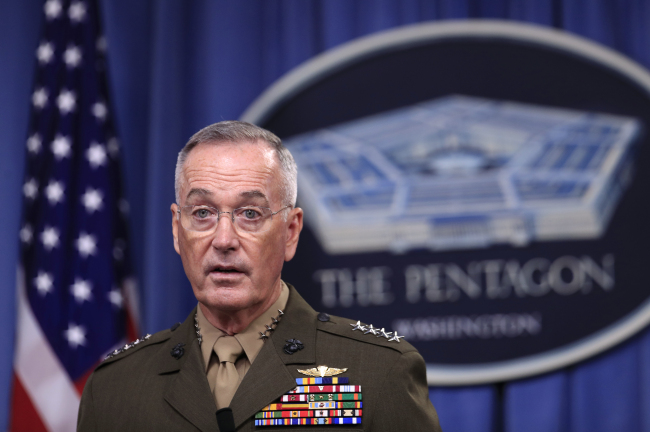Top US general’s remarks spark debate over fate of USFK
By Yeo Jun-sukPublished : Nov. 7, 2018 - 15:51
Remarks about the Korean Peninsula by a top US military officer have sparked debate over the future of the 28,500 American troops stationed in South Korea.
Gen. Joseph Dunford, chairman of the US Joint Chiefs of Staff, said Monday that the US would have to start making “some changes to the military posture on the peninsula” over time if talks with North Korea make progress.
While Dunford did not elaborate on what those changes might be during a recent forum at Duke University, the remarks have given rise to speculation in Seoul. Some have questioned whether US Forces Korea would consider withdrawing if North Korea made substantial progress on denuclearization.
“Dunford is not talking about things that are going to happen immediately, but brought up issues that will be discussed inevitably,” said Shin Beom-chul, a senior researcher at the Asan Institute, a Seoul-based security think tank.
“If denuclearization talks reach a final phase and North Korea begins to give up its nuclear weapons, they (North Korea) would want to bring up the issue of USFK and change its characteristics in accordance with a new security environment.”

North Korean leader Kim Jong-un is reported to have pledged during his summit with President Moon Jae-in in September that he would not demand the withdrawal of USFK troops or the US-led United Nations Command.
However, skepticism persists among conservatives in South Korea that Pyongyang could change its position if the two Koreas and the US were to declare an end to the Korean War and subsequently enter negotiations for a peace treaty to replace the current armistice agreement.
Faced with the burgeoning controversy, the US Joint Chiefs of Staff downplayed its chairman’s remarks, saying there were currently no plans underway to reduce the US military presence on the Korean Peninsula, nor were any such plans under consideration.
“Gen. Dunford was simply highlighting that the Defense Department is in support of the State Department when it comes to the ongoing diplomatic negotiations with North Korea,” JCS spokesperson Col. Patrick S. Ryder told Voice of America.
However, Ryder said the Pentagon “must be prepared to adjust as appropriate” if negotiations with North Korea advance, indicating that there could be changes to the military exercises with South Korea that are scheduled to take place next year.
The allies have already suspended most of their major joint exercises since the first US-North Korea summit in Singapore in June. These include the computerized command post drill Ulchi Freedom Guardian and the air-combat exercise Vigilant Ace.
Cheong Wa Dae declined to comment on Dunford’s remarks, but the presidential office reiterated Kim Jong-un’s pledge, made during meetings with Moon and his top aides this year, that the North would not demand the withdrawal of USFK troops.
“It is difficult for us to comment on Chairman Dunford’s remarks, because we don’t know exactly what he meant by it,” presidential spokesperson Kim Eui-kyeom said in a regular press briefing on Tuesday.
“Chairman Kim Jong-un has said that declaring an end to the Korean War has nothing to do with withdrawing US troops in South Korea or weakening the US-South Korea alliance. … President Moon has also made the same points multiple times.”
(jason@heraldcorp.com">jasonyeo@heraldcorp.com)




![[Herald Interview] 'Amid aging population, Korea to invite more young professionals from overseas'](http://res.heraldm.com/phpwas/restmb_idxmake.php?idx=644&simg=/content/image/2024/04/24/20240424050844_0.jpg&u=20240424200058)












![[KH Explains] Korean shipbuilding stocks rally: Real growth or bubble?](http://res.heraldm.com/phpwas/restmb_idxmake.php?idx=652&simg=/content/image/2024/04/25/20240425050656_0.jpg&u=)

